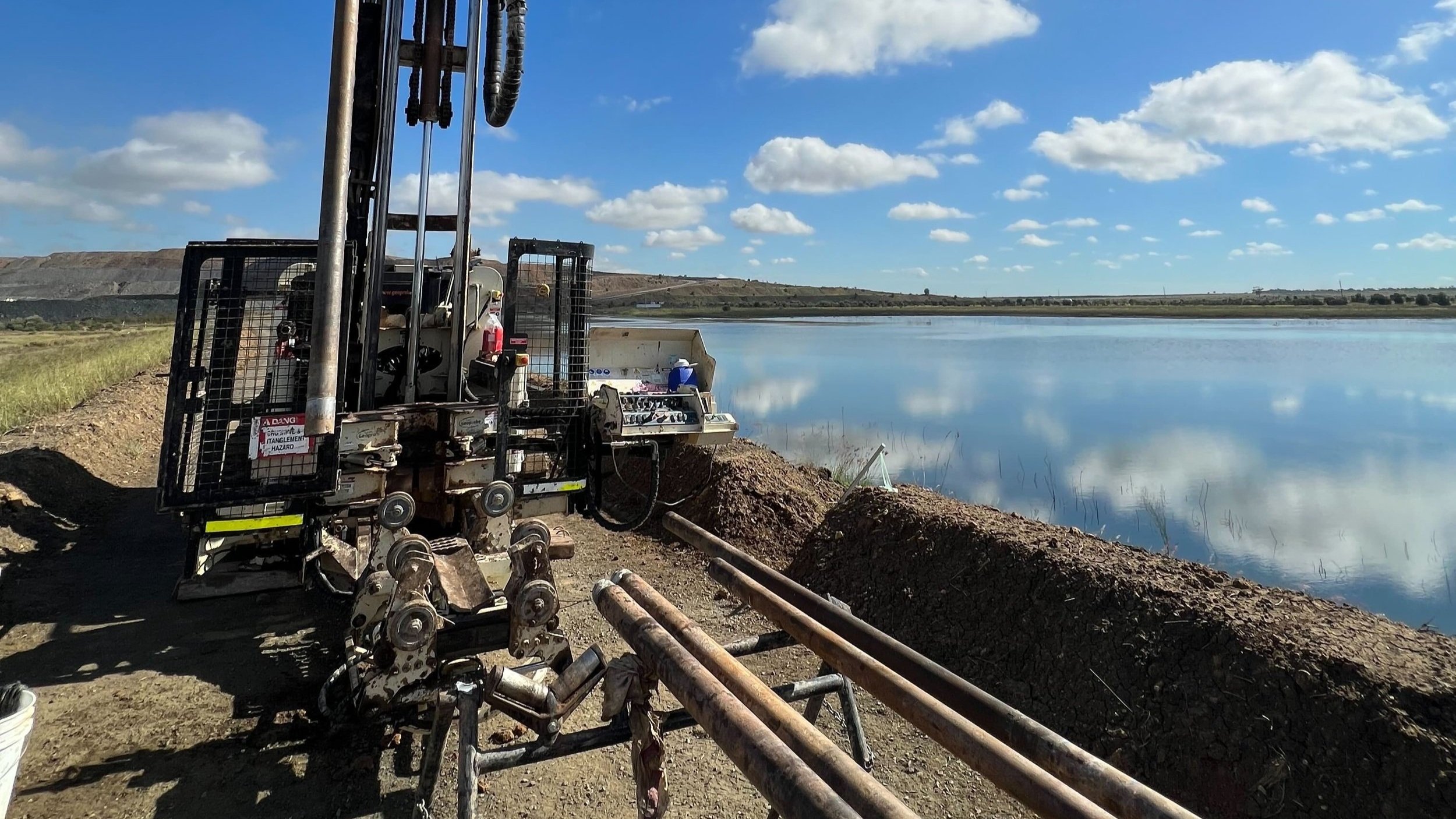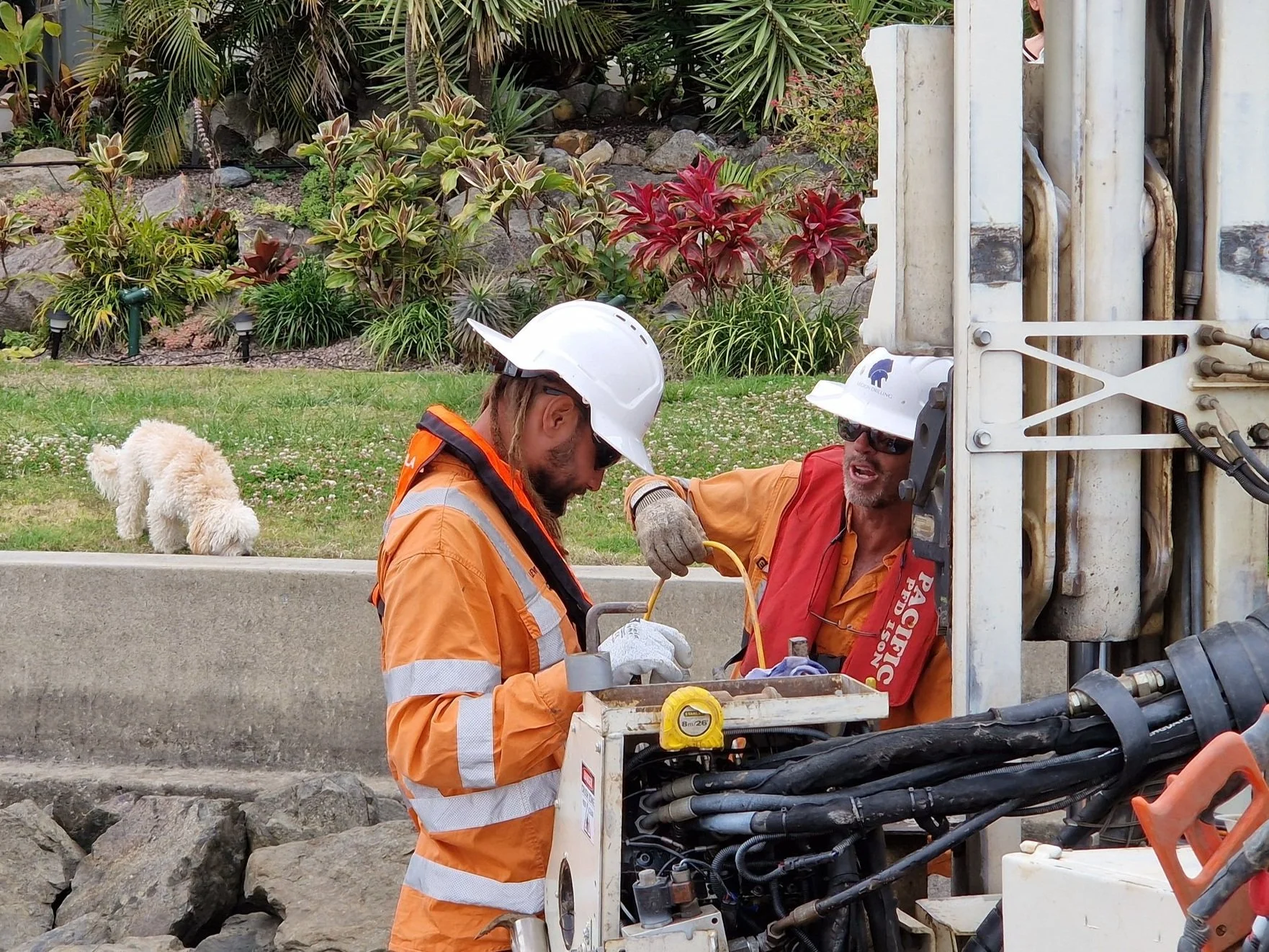
Standard Penetration Test - SPT
Site Assessment with the Standard Penetration Test - SPT
Drilling team conducts SPT and Cone Penetration Testing (CPTu) on the foreshore of a marina using a Geoprobe rig.
Gain Geotechnical Insights with Legion Drilling
The Standard Penetration Test (SPT) is a widely used in-situ testing method for evaluating the geotechnical properties of subsurface formations. At Legion Drilling, we ensure compliance with international standards for SPT equipment and procedures, delivering quality results.
The SPT involves driving a split-spoon sampler or solid cone into the ground using a 63.5 kg hammer dropped from a height of 0.76 m. The process measures:
Seating Drive: The number of blows required to drive the sampler 0.15 m.
Standard Penetration Resistance (N Value): The blows needed to drive the sampler an additional 0.30 m, used to characterize the soil formation.
During testing, samples can also be collected for further analysis.
To account for variations in hammer energy transfer, N values are commonly corrected using an energy transfer ratio (ETR) of 60% of total potential energy, referred to as N60. Legion Drilling utilizes fully automated SPT hammers for reliable energy delivery and consistent measurements.
QA/QC Methodologies and Calibration of Standard Penetration Test Equipment
To ensure the accuracy and reliability of SPT results, proper QA/QC checks of the equipment is critical. The following methodologies are typically employed for assessing SPT equipment:
Energy Transfer Measurement:
Calibration involves measuring the actual energy delivered to the split-spoon sampler during testing. This is achieved using strain gauges and accelerometers mounted on the drill rods to determine the energy transfer ratio (ETR). These instruments record the force and velocity of the hammer blow, enabling calculation of the energy imparted to the system. The results are then used to standardize the N value to N60.Drop Height Verification:
The hammer drop height (0.76 meters) must be regularly checked using physical measurements or automated systems to ensure compliance with standards. Even minor deviations in drop height can significantly affect energy delivery and test results.Hammer Performance Testing:
Routine inspections and testing of the hammer system, including its weight and release mechanism, are essential to verify consistent and accurate operation. Fully automatic hammers, like those used by Legion Drilling, minimize operator-related inconsistencies.Rod Straightness and Condition:
The drill rods used in SPT must be checked for straightness and physical integrity. Bent or damaged rods can lead to energy losses and inaccurate N values. Regular maintenance and replacement of rods ensure the reliability of the test.Split-Spoon Sampler Inspection:
The dimensions, wear, and condition of the split-spoon sampler are examined to ensure compliance with standard specifications. Any deviations can affect the penetration process and the accuracy of sample collection.Periodic Calibration by Certified Agencies:
Equipment should undergo periodic calibration by certified laboratories or agencies to meet national or international standards (e.g., ASTM D1586). This ensures that the entire testing apparatus meets the required specifications for accurate geotechnical investigations.
By employing these calibration methodologies, Legion Drilling ensures the consistency, accuracy, and reliability of SPT results across all projects.
Advantages and Disadvantages of Standard Penetration Tests (SPT)
Advantages:
Widely Recognized Method: SPT is one of the most established techniques for geotechnical site investigations, with standardized procedures accepted globally.
Simplicity and Versatility: The test equipment is simple, portable, and can be used in various soil conditions, including sandy, silty, and clayey soils.
Disturbed Sample Collection: Provides soil samples for visual classification and further laboratory testing.
Cost-Effective: SPT is relatively economical for basic site investigations.
Correlations with Geotechnical Properties: The N value obtained from SPT is extensively used to estimate soil strength, density, and other engineering properties.
Disadvantages:
Energy Efficiency Variability: Different hammer systems and operator techniques can lead to inconsistent energy delivery, necessitating corrections like N60 for accurate interpretation.
Disturbance of Samples: The collected samples are disturbed, making them unsuitable for certain advanced laboratory tests.
Limited Accuracy in Cohesive Soils: SPT is less reliable for characterizing soft clays or very loose sands.
Data Resolution: The test provides point data (N values) with limited spatial resolution compared to continuous profiling methods such as Cone Penetration Testing (CPT).
Time-Consuming in Certain Conditions: Conducting SPT in challenging ground conditions, such as very dense or cemented layers, can require more time and effort.
Why Choose Legion Drilling for SPT?
Legion Drilling combines technical expertise with advanced equipment to deliver precise and efficient Standard Penetration Testing services. Our team ensures all tests meet international standards, providing reliable data for geotechnical site investigations. We have 15 drilling rigs that are capable of undertaking an standard penetration test SPT with all units being automatic hammers with full safety guarding.
Contact Legion Drilling today to discuss your project and learn how our SPT services can support your geotechnical goals.
Standard Penetration Test (SPT) Procedure: Measuring and Recording Blow Counts (Metric Version)
The Standard Penetration Test (SPT) is an in-situ geotechnical test that assesses soil resistance by driving a split-spoon sampler into the ground using a standardized hammer. The SPT blow count (N-value) is essential for soil classification, foundation design, and bearing capacity assessment.
Step-by-Step Procedure for Conducting SPT and Recording Blow Counts
1. Equipment Setup
Drill a borehole to the target depth using a hollow-stem auger, rotary drilling, or percussion method.
Clear loose cuttings from the borehole to prevent obstruction.
Position the SPT split-spoon sampler (standard 51 mm OD, 35 mm ID, 450 mm length) at the bottom of the borehole.
2. Driving the Sampler & Measuring Blow Counts
A 63.5 kg hammer is dropped 760 mm onto an anvil, transferring energy to drive the split-spoon sampler.
The sampler is driven into the soil in three 150 mm increments (total of 450 mm).
Record the number of hammer blows required for each 150 mm increment.
3. Recording the Blow Counts (SPT-N Value Calculation)
The first 150 mm of penetration is considered a seating drive and is not included in the final N-value unless refusal occurs.
The blows for the second and third 150 mm increments are added together to obtain the SPT-N value (also called the N-blow count).
Formula:
N=(Blowsfor150−300mm)+(Blowsfor300−450mm)N = (Blows for 150 - 300 mm) + (Blows for 300 - 450 mm)N=(Blowsfor150−300mm)+(Blowsfor300−450mm)
Example Calculation:
First 150 mm: 5 blows (ignored)
Second 150 mm: 7 blows
Third 150 mm: 10 blows
SPT-N value = 7 + 10 = 17
If 50 blows are recorded before penetrating 150 mm, it is considered "refusal", and testing is stopped.
4. Correcting the SPT Blow Counts
Since SPT values are affected by overburden pressure, rod length, borehole diameter, and hammer energy, corrections may be applied:
Overburden Pressure Correction – Adjusts N-values based on effective vertical stress using the Peck, Hanson, and Thornburn (1974) correction.
Energy Correction (N60) – Normalizes for variations in hammer energy efficiency (60% of theoretical energy is the standard).
Energy Correction Formula:
N60=N×ER60N_{60} = N \times \frac{ER}{60}N60=N×60ER
where ER is the hammer energy ratio.
5. Data Recording and Reporting
Record SPT blow counts for each 150 mm increment in the field log.
Document soil type, groundwater level, drilling method, and any test anomalies (e.g., sampler refusal or borehole collapse).
Report corrected SPT-N values in geotechnical site investigation reports.
Key Considerations for Accurate SPT Results
✔ Ensure hammer free-falls from the standard 760 mm height each time.
✔ Use calibrated SPT equipment to maintain accuracy.
✔ Prevent borehole softening by using the appropriate drilling method.
✔ Apply corrections to improve data reliability.
The SPT-N value is crucial for soil strength assessment, foundation design, and liquefaction analysis. Let me know if you need SPT correlations for soil properties or specific correction factors!
Further Information on Standard Pentration Tests
Our technical specialists will be happy to provide further information and discuss in detail any specific project requirements.
In the meantime, we recommend you to consult the following documents:
AS 1289.6.3.1—2004 (Reconfirmed 2016).
Das, B. M., & Sivakugan, N. (2019). Principles of foundation engineering (9th Edition). Cengage Learning.
Robertson, P. K. (2012). Interpretation of in-situ tests—some insights. J. K. Mitchell Lecture, Proceedings of ISC’4, Recife, Brazil. https://www.cpt-robertson.com/PublicationsPDF/Robertson%2C%20Mitchell%20Lecture%2C%20ISC'4%2C%202012.pdf

